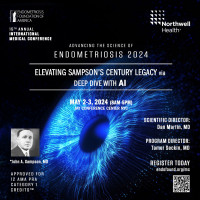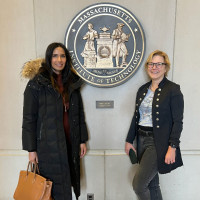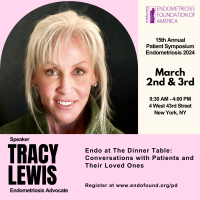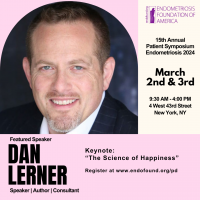Endofound Medical Conference 2017
"Breast, Ovary and Endometriosis"
October 28, 2017 - Lotte New York Palace Hotel
Panel Discussion
Dr.Seckin: Anyways, we're wrapping up, are there any questions? I do not know whose left here but thank you. We still have a lot of people here. I'm hoping some questions will pop out ... any questions? Sally Sorrel.
Female: I have a question for Dr. Taylor. When you talk about the synthase and lymphocytic activity so have looked at the goal of using medical therapy that absorbs those type of cellular activities? So I'll disclose on pelvic research so that's my role in Endometriosis, I was just curious of what you guys have done in your labs.
Dr. Taylor: Yeah we've actually not collaborated much, I went for the first time to IPPS meeting. In fact you look kind of familiar. Yeah so that's ... I think multi disciplinary approaches though and it's really not incorporated as much in my own ... Oh thank you ... You know in my own practice. The sort of manipulations to manage indologenous immune cell function is not so well understood. There are a lot of therapies that are promoted to sort of alter immune cell populations that I don't we actually understand well enough now to really be able to ... In my own experience from what I've read and the patients that I've seen. Now I'm not at all ... I don't doubt that in the future when we actually have approaches, maybe nutritional, certainly you know exercise other things that or you know PT perhaps you know massage and things like that can really be shown to be beneficial in this direction. I think we do have the ability to kinda manipulate the kinds of immune cells that are circulating.
Whether we can really change how those are attracted to individual Endometriotic lesions is a kind of another question. And I guess one of the things that Surdar actually pointed out in his presentation is kind of a hypothesis or a speculation is that endometriosis cells with this kind of stem cell characteristics have the ability probably to take on some of the feena type of immune cells themselves. So what we attribute to immune cell activation of Endometriosis cells might actually become incorporated little bit like the ability of those cells to make their own source of estradiol, they might be able to make their own cnidarians and things and possibly evade normal kind of immunological responses. So I think that there's going to be a lot of different things that develop in the future and I think we should have an open mind about all those.
Dr.Seckin: Yes Susan.
Susie: I have a question for Dr. Taylor. I see you, okay. So you mention that Endometriosis the immune cells and cnidarians are in war. My question is for Endometriosis surgery after you ... Inside the lesion, how well is the healing process? Were the immune cells and the cnidarians also in war, and what are the differences?
Dr. Taylor: Well, so that's something that I don't know that we've you know studied very well either. But yes in the healing process is definitely an inflammatory response, there's no question about it that if your immune cell population is depleted you don't heal wounds, skin incisions, all of the various things that occur don't happen in a normal fashion. Now it's been pointed out here, it's possible that some of this inflammatory response is over exuberant. That there's too much of an immune response, there's too much scar tissue formation, there's too much of an inflammatory response. So I think in the future it'll be interesting to see if we can actually develop ways of kind of modulating wound healing in the post operative setting.
The difficulty there is gonna be we obviously don't want to impair normal wound healing. But we also don't want to introduce excessive adhesion formation, which we know is a real problem in Endometriosis, particularly with repetitive surgeries. And adhesion prevention approaches with mechanical barriers, in my own experience I've not been so satisfied with how those have worked. But I think that it's an interesting idea to think, "can we do immune modulation right around the time of surgery and would that have an effect on long term ... You know decrease the risk of re-occurrence," I think it'd be an interesting question.
Susie: Thank you so much. I have another question for Dr. Oktay
Dr. Oktay: Dr. is here yeah
Susie: Yeah. So-
Dr. Oktay: I didn't know I was going to get questions so.
Susie: As far as DNA repair is concerned, so do you think ... Is there any rule about the low egg quality in Endometriosis patients about the DNA repair damage?
Dr. Oktay: So your question has two parts. One is that there's low egg quality in Endometriosis patients, and the second part is-
Susan: Is the DNA repair inhibition also got involved in the low egg quality of Endometriosis patients?
Dr. Octa: Sure, I'll take it in two parts. First of all we're not so sure that egg quality is altered in Endometriosis. We know that if you do too much surgery in the ovaries you can alter ovarian reserves but I think the egg quality part is a bit more debated. However, I wouldn't see any difference if there's diminished egg quality in Endometriosis. I would expect DNA repair ... Decline in DNA repair to play the same role. Obviously we don't know the overall impact of declining DNA repair, there could be other things. I mean I don't have time to discuss one of the interesting things about DNA repair pathways, they're also involved in telomere function. Before telomeres involved that pathway is so preserved so primordial. They were actually doing the job the telomere were doing.
In brocho-mutant individuals actually telomere function is also altered, so there are lots of mechanisms there and whether endometriosis adds to that, that's an interesting question. I don't know if anybody has done research into terms of looking at DNA repair function in endometriotic implant or these patients. Could that be related to that? Aromatase function is related to brocho as well, it's a suppressor of aromatase enzyme, which is important to endometriosis, breast cancer. Probably one of the mechanisms why these women also develop breast cancers in a brocho-mutant situation, aromatase suppression is less. So a lot of complex interactions possible.
Susie: Thank you very much.
Dr.Seckin: Well I think we're just ... I like to be ... On the schedule we have a panel here, but I guess this questions and answers are gonna replace that panel since we are very friendly all together. I appreciate everyone staying here. My comment ... Was there a question? Oh.
Female 2: I just have one question to Dr. Burgoh. Hi, I'm just interested in the fact that you found the brain function improve with estrogen replacement in post menopausal women. Where as, there was a study which was long standing they said deterioration of mental function with the use of ... Especially with the use of estrogen and estrogen use in post menopausal women in a prospect of a study of nurses study. And therefore seems to be very contradictory, what did you ... I mean you've obviously done the scientific research. Is it possible that that is just an observational rather than a real scientific study? The previous study, I know many flaws where there in that study and now menopause society has come up with reversal of certain dictum which have passed on so many years back to all of us and we're not using [inaudible 00:09:04] replacement at all.
Dr. Berga: So it's a pretty controversial topic, and I think you're referring to the women health initiative-
Female 2: Sorry yes-
Dr. Berga: And then they had the WHI memory study, so WHIMS, and it wasn't actually designed into the study. So I was a co-investigator of the WHI, and belatedly they decided that they should collect some data. So they did some after fact survey data, so these are just inventory sigmetric inventories of performance. And then they looked at diagnosis, and so the study itself had a lot of little issues in terms of randomization. But the biggest problem was that they didn't have very many people with dementia of any type. So the entire conclusions are based on about fifty patients out of a large data set that developed dementia. And it's common in hemopathology in population science that the larger the number that you study, the more likely it is that you have an accurate answer. So subsequently people have gone on to design better trials.
I think I showed you what I think is the best one, which is the Cash County study. And they, every ten years, updated their study so they've got a more detailed updated on the study. I showed you the initial one from 2003 - 2004, which I think is just easier to show because of the clarity of the graph but the same conclusions pertain. And then other studies have been done so I showed you just a few of those. So if you look at it just from population science you know it's starting to shift in the other direction in the pendulum swinging. When you add in the other data from molecular studies, animal studies, mechanism of action studies it starts to be more persuasive. So it's true that this one study and I actually was in the newspaper quoted about it, and the time it broke out I actually got to see the data and write a little editorial.
This one study really had a large impact because it came early in the, what I would say, the fear phase of the WHI news. And it didn't go away yet because people are still fearful, and fear drives a large part of how we think. So it's really hard even if I tell you all these facts about it, the things to overcome that fear that got started. So I think that's where we are, but I also will say that we haven't done a complete due diligence on this topic. And there's lots left to be done in terms of dose, and type, and how long, and when, and ... So the more we have to ask detailed questions in order to have better advice for you. So the big picture is stay tuned and hormones play a role. The little picture is we need more details to really be fully able to advise people depending on their circumstances. I-
Female 2: Thank you so much-
Dr. Berga: I don't know if that helps you, but-
Female 2: It's very interesting, thank you.
Dr. Berga: Okay.
Surdar: I just want to make a couple comments on the record as we closing, just about, very soon. As you know we have given with our limited sources close to half a million dollars for research in the last two years or so. That is significant an organization like us can do that, we are not trying to invent something spectacular but encourage the community that research is one of the most crucial part for endometriosis rese ... endometriosis facts to be found on endometriosis because this disease still as much we try, even though there's some awareness going on we're still very behind. So I am looking for private money to basically flow into this, we will do everything to do that. So I need your support as well as if you have ideas how to structure finding the right research, I like to hear your comments and I think this year again we will give again close to two hundred fifty thousand dollars for the right researcher. The second thing is, on the record I like to express my gripe against IVF practices in United States. It's not only, you know, we all know but I think the awareness and the education of woman when their chances of fertility seeking goes beyond thirty five. Very few realizes that chances get so slim, and you feel so bad that they all get disappoint mostly on this path.
Unfortunately there's not a single IVF clinic I know that ask any specific endometriosis questions to the patients. For them endometrioses is just endometriomata, unbelievable. And I don't know what to do about this, and unless we really do one meeting about this scope of our concern in the future. I just want to express on the record, and we know that because we see a lot of these patients and many of them get pregnant after estrogen surgery and they follow in 3 - 4 months by themselves. There are so many stories like that and you all know that. This meeting was about sudatories, and endometriosis ovary, and breast but it's about also inflammation. I think the value of info ... The understanding inflammation in every duties particularly in endometriosis is so crucial. The most physical aspect of endometriosis or quantity, the pathology, the quantity physically is fibrosis. It's the fibrosis that is on a superficial layer distorting the paratonia, it's the fibrosis that distorts the organ and cause organ disfunction.
So in that sense I hope your perception will change with this meeting, and it's important to understand the value of team work from my perspective as a surgeon. And these surgeries do take multiple surgeon, many hours to do in the right ... Even I personally think early endometriosis surgery much difficult than the radical big surgery because in ... Obviously challenging big surgery bowel resection endo .... You know what you're gonna do. In the other one you really have to seek for lesions, and there are lesions. There are lesions, these wounds are not making it up.I know it, hopefully we will one day publish our patient satisfaction reports. They are doing well, and they cannot ... They are doing well beyond three months. So good excision means a lot for these patients, esperitonim has more physical value than just a transparent organ or it's superficial [inaudible 00:16:36] it's not. Every lesion is connected microvascularly to a nerve underneath in that inflammation process.
I learned a lot, this was a very challenging conference for me. I honestly was very ... I was particularly very nervous, as I told you I had my personal reasons to do this, but I'm so happy. Even though we touched every corner of in our medical field that estrogen touches a targeting organs including brain, and the fertility elements. I learned so much, I couldn't have learned this in any other meeting that I would go for endometriosis because I know it all, everybody is repeating the same thing. So it's nice to ... I could look to one of the translational ... It's nice to translate what we do to others and learn from others because, I don't know who said that, we have grown so far away with this speed of technology, and knowledge, and the research ... I can't follow what he's saying. I don't think anybody can even as a physician and beyond certain levels, but I am interested to go back and take a look again. Understand that I am challenged, I think that makes me very happy. I am interested to learn any time in my life.
Anybody else ... I really appreciate ... I'm gonna close at 6 O'clock. Thank you very much, it was very nice. I congratulate you, I mean it, you made history today. So it's gonna be marked, and we had above five thousand followers on Facebook today that watched the whole conference. Except the breast reconstruction section Facebook shut the site down. And then they re-opened again, they were following apparently so I just for the record.
Female 3: Are you serious?
Dr.Seckin: Yes.
Female 3: I didn't realize.
Dr.Seckin: Thank you very much.
Dr.Seckin: I really want to put the thank you slide so I don't want to forget anything. I particularly thank Leslie, and Jean. Leslie Crutchfield who's our intern executive director, Jean who helped us for everything we needed, Sarpar without we couldn't have done it, Suanne Harrison, Carly, Dennis, my wife, my family thank you very much for giving us a hand. Thank you.








